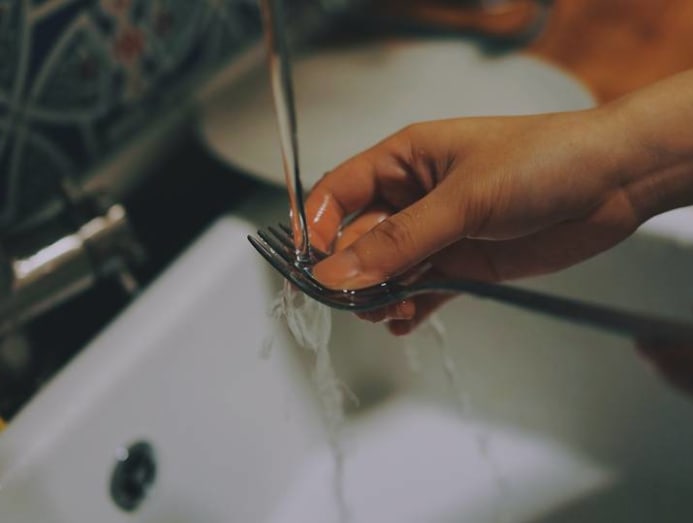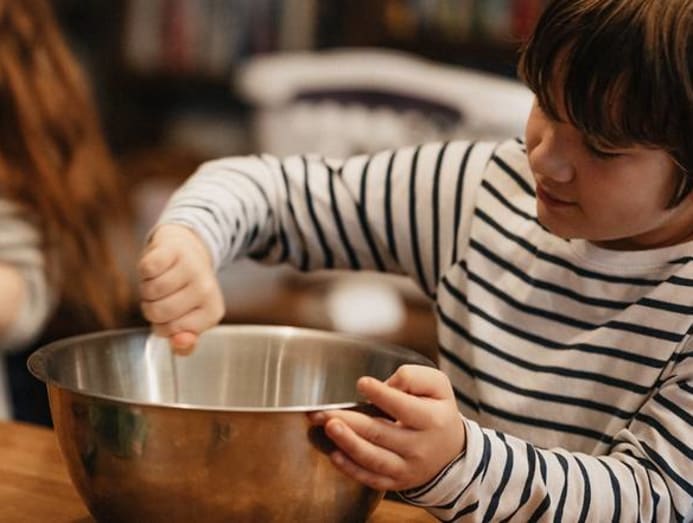Parents, put your kid to work – it's actually good for their mental health
I begged my 12-year-one-time to assistance me with the pandemic task of learning to dye my hair at home.
I could have done it myself, but I've learned that small opportunities to feel useful and successful are good for kids' mental health, which I'm especially attuned to in our current circumstances.
Among the other ideas I've tried during these long months: Letting my kids practice phone skills by having them call to society takeout and request them for help with setting up the Wi-Fi booster.
In some cases, it would be faster to just exercise these things without their "aid," merely I'm doing it deliberately, to benefit my kids.
It might seem like a foreign time to ask parents to have a new approach – don't we take enough to juggle? But focusing on helping our kids develop what psychologists call "self-efficacy," or a person'due south belief that they are capable of successfully meeting the tasks or challenges that face up them, tin yield firsthand benefits.
READ: Your kids always fighting? The reasons behind sibling rivalry and how to deal with it
Simply can such small tasks really instill a sense of control right now, in a pandemic? Information technology's possible, experts say, and allowing kids to endeavour to come across real-life challenges is the all-time manner for them to build that healthy self-efficacy.
Albert Bandura, the Stanford University psychologist who offset developed the concept of self-efficacy in the 1970s, called these of import first-person accomplishments "mastery experiences."
Lea Waters, professor of positive psychology at the University of Melbourne, Australia, said self-efficacy "is a fundamental part of the formula of adept mental health, because without that sense of efficacy, without that belief that I can get things done, yous can really easily see how a young person or even an adult would not simply lose their confidence but lose their motivation to motility frontwards."

Humans thrive on a sense of control and capability; low self-efficacy, or learned helplessness, is associated with anxiety, depression, lack of hope and lack of motivation, she said, while higher self-efficacy is associated with life satisfaction, self-confidence, social connection and growth mindset.
Mastery experiences don't take to exist m accomplishments. Waters pointed to things every bit minor as kids completing "a Lego build that was a little bit hard", packing their own backpacks or walking the canis familiaris by themselves.
She suggests that parents become detectives who detect a child'south successes and narrate them. This purposeful shift toward noticing and acknowledging small wins helps parents take a positive approach while it also helps kids internalise a sense of their growing abilities.
"We can spot those things and acknowledge, 'You did that really well; y'all did that all past yourself', or 'Y'all didn't need every bit much help from me this time effectually'," she said.
These successes build up what she called a "banking concern business relationship" of feelings of efficacy for children that they can draw on the next time they face a challenge, when parents can remind the child, "Yous know, last time you felt that manner, and then you ended up being able to do it all by yourself".
Of grade, you don't want to pile on more responsibilities than a child can handle. Parents should ever be attentive to children'due south health, ensuring that they don't see signs of mental health issues that warrant professional back up, said child and adolescent psychotherapist Katie Hurley, author of The Happy Kid Handbook.
"Every kid is unlike," Hurley said. "Take a deep jiff and say, 'What is my kid similar without a pandemic?'"
Picket for apropos changes in sleep; eating significantly less or more; new broken-hearted behaviours such every bit constant reassurance-seeking or clinginess; a meaning loss of focus; and less involvement in connecting with friends, even in favourite ways like social media or video games, she said.
"Trust that when y'all feel that in your gut that something isn't right, then it's probably a good idea to become assistance."
READ: Parents, at that place'south an upside to giving your kids more screen time – they get creative
The impulse to "help" our kids by doing more than for them is sometimes more about us than it is about our kids, said Ned Johnson, co-author of The Self-Driven Child: The Science And Sense Of Giving Your Kids More Control Over Their Lives.

Research has shown that when parents jump in to aid kids with a frustrating problem, that intervention can lower parent anxiety while leaving the child's feet elevated, Johnson said.
That's because the broken-hearted parent gains a sense of control from taking action rather than remaining helpless on the sidelines, but the child is still left feeling ineffectual and stressed.
It tin be hard for parents to let children do more than, and possibly mess up, when a parent could do a task more quickly and effectively.
But the pandemic has lowered the stakes in some mutual family situations. For case, when kids are doing remote learning and don't have to catch the jitney, they can have on responsibility for waking themselves upwardly.
If the child oversleeps, the parents aren't stuck playing chauffeur; just the kid will experience the natural consequences of lateness, Johnson said, making it easier for parents to let go of some command.
With everyone spending more time at habitation, families can share tasks more readily, too, fifty-fifty if they're not done perfectly.
A preschooler with a broom may not necessarily be cleaning the flooring well, but the child feels that efficacy-building sense of accomplishment and helpfulness when they are encouraged to try information technology for themselves, Johnson said, and "the experience of coping increases".
If this all sounds like also much piece of work in a pandemic, remember that parents who encourage their children'southward strengths and self-efficacy not only assist their kids simply too themselves.

"Parents are really depleted," Waters acknowledged, simply a positive, proactive approach is "kind of a win-win. It's good for your kids" and seeing children thrive is "good for us as parents also", she said.
And her research has institute that using a strengths-building approach – finding areas where your kids tin can take on more responsibleness – is too correlated with an increase in parental self-efficacy, a sense that "you are doing the right thing as a parent".
Courtney Ackerman, author of several positive psychology books, also counsels parents not to wait until the current crisis is over to instill more than self-efficacy in children.
Yep, working on developing resilience in these unpredictable times may feel like shovelling while the snow is still falling, she said, simply that's okay.
"I think it's e'er snowing," she said. "It's a specifically difficult time now with the pandemic, but life is total of ups and downs."
Now is an excellent time, perhaps better than any other, she said, to work on edifice a sense of self-efficacy in kids. And if that means parents aren't the only ones incessantly loading and unloading the dishwasher, and then much the better.
By Sharon Holbrook © The New York Times
This article originally appeared in The New York Times.
https://www.nytimes.com/2021/02/11/well/family/children-chores-skills.html
Post a Comment for "Parents, put your kid to work – it's actually good for their mental health"